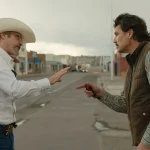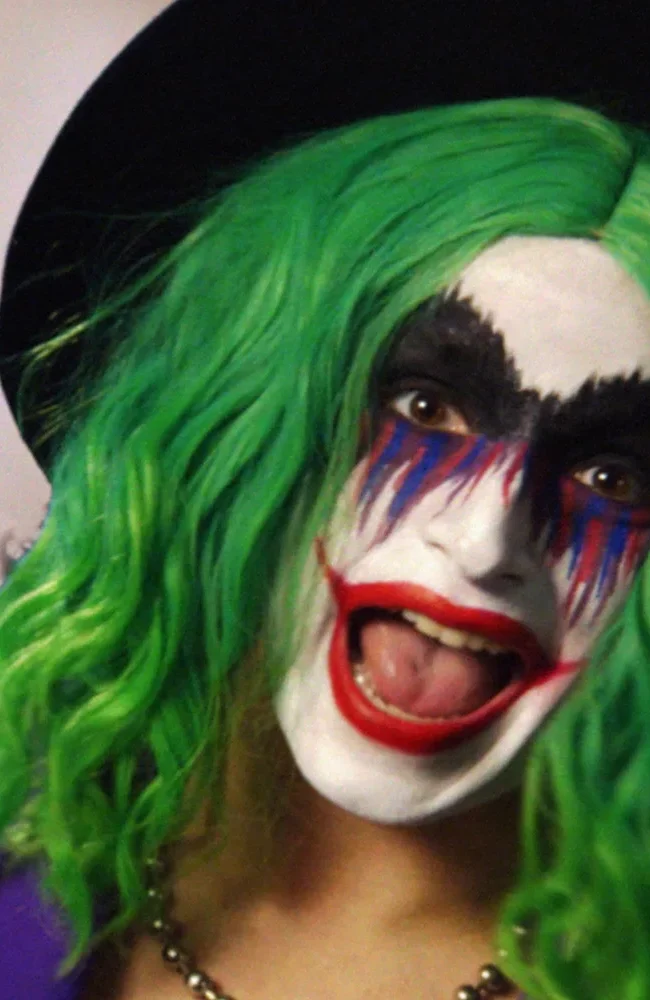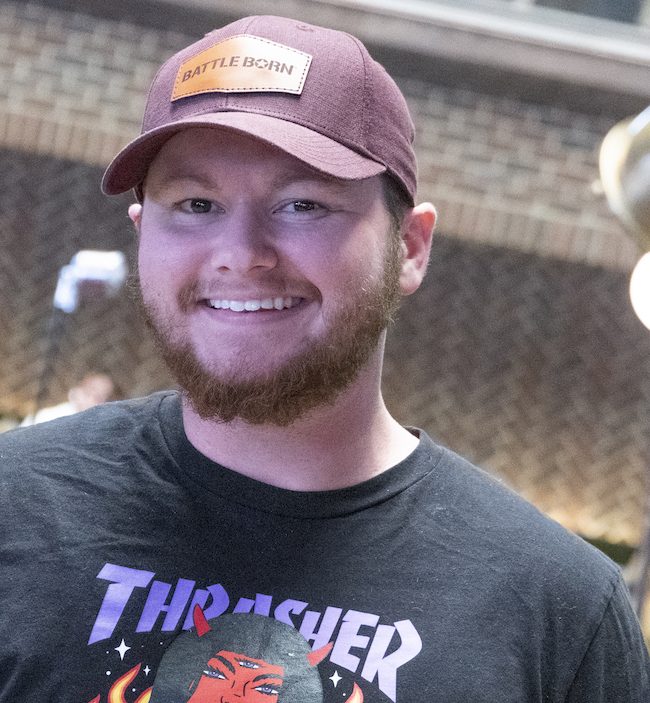A Conversation with Corey Sherman (BIG BOYS)
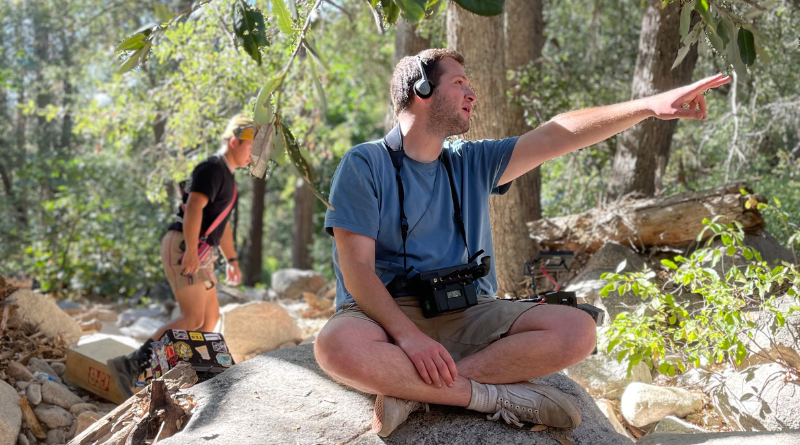
No one likes being 14. That age just sucks. Unless you happen to be the lead character on the Disney show, or arguably the actor portraying that lead character, real life conflicts come at you from every angle and never end simply before the credits roll. In Corey Sherman’s brilliant coming of age comedy Big Boys, Jamie is about to embark on a cousins camping trip, not knowing it’s the first step in a journey that he will travel for his entire life. Played with remarkable depth by actor Isaac Krasner (like an actual in life 14 year old), Jamie starts the day probably with an inappropriate crush. However it becomes clear by that night that his whole identity has gone into upheaval when he begins to have unexpected feelings for her boyfriend, an unattractive guy with a larger frame.
Despite the growing (I’m going to say) tolerance of gay and trans masculine bodies, there still exist a lot of toxic notions of masculinity to damage any one growing up slightly outside the lines of ‘standard’ sexual or gender expression. Alone in a tent at night Jamie comes face to face with his insecurity not only about being attracted to men but also what it means to be a man.
After a highly successful run on the festival circuit, Big Boys is out now on VOD on all platforms. I had a chance to sit down with Corey to discuss the film that had to be made, and how we are oh so lucky that he was the one who decided to make it.
Hammer to Nail: Do you know what? I think your movie just gets right and there’s not enough of this, I’m calling it sympathetic cringe. It’s that thing when you’re watching something and you’re like “I am very uncomfortable right now because I have lived the exact experience except completely different,” but it is the exact feeling that this character is going through right now.
Corey Sherman: I’m glad that it feels like it has all the fun and energy and I understand the pain of cringe, but that it never feels like it’s just trying to make you uncomfortable for the sake of uncomfortable, but it’s like you’re cringing on behalf of some of a character you care about.
HtN: Absolutely. You wouldn’t cringe if you didn’t care.
CS: Right? Totally, totally.
HtN: It’s like John Favreau’s Swingers when he keeps leaving messages and you’re like “no, don’t do that.”
CS: Totally. I just saw that movie for the first time recently. It was so good.
HtN: So let’s go all the way back. I still feel like this film is something no one has ever made a film about really. I mean, I think we see all these coming of age movies and we see all these coming out movies. We don’t see as many coming of understanding of yourself movies, and we certainly don’t see it specifically in this, I guess, ‘niche’ of understanding. It feels like you found a movie that needed to be made in a way.
CS: I think it was sort of that thing you want to see in a movie and that you haven’t seen before, and then there’s a feeling of ‘well, there’s an opportunity here.’ I could be the one to make it. Which is exciting. Anytime that you feel like there’s something fresh that you feel like you also have a personal connection to, it’s really energizing of like. And so there were a few things with this movie. One was a sort of unrequited crush story about a kid who gets a crush on an older person who he can never have for a number of reasons: the person is straight, he is dating his cousin, he’s almost twice his age. But just because a crush can’t go anywhere, it doesn’t make it any less strong. In fact, sometimes it can make it even stronger. And that crush would create a sort of engine both for Jamie to try to get closer to Dan and also an engine that forces Jamie to come to terms with his own sexuality.
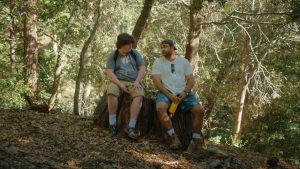
A still from BIG BOYS
It’s a watershed moment of ‘this is just who I am and I have a choice now to accept it or to continue to repress it,’ and Jamie chooses ultimately to accept it. So that was a really exciting, that story deserves its own movie. And so it was really exciting to find the ways in which people could still invest in the movie and connect to the character, and then also with the character just being chubby and not being sidelined into a sidekick, but being the main character. And for the object of his desire to be a big guy as well, and for the movie to take that desire seriously and not turn it into a joke. I feel like all that was something I had barely seen before.
HtN: I mean, let’s face it, most people’s first crushes aren’t consummated. We rarely get the first person we’re into.
CS: Totally.
HtN: And I also think when we’re starting in love that we have a tendency to fall for people that we can’t get simply because then it makes it safer to fail. Like, well, I never could have gotten that person anyway, so if you set yourself up to not be able to be disappointed.
CS: Yeah, it’s a really good point. I never even thought about it that
HtN: I think one of my favorite moments of the film is when he is creating the list of reasons why he’s not gay. That kind of positive, negative columns, but he goes as far to write it down on paper in pretty much complete sentences as opposed to a just in-his-head activity. Is that how you make decisions?
CS: Not really. I liked the idea of Jamie being, I think even more sort of methodical than I was at that age. I mean, he brings spices on the camping trip. I don’t think that’s something I would’ve done, but I think it was just a way to to communicate an internal monologue. I mean, because he’s a 14-year-old, that’s how he’s been taught to figure things out in school — on paper to reason it out. And that I definitely do connect to because there was, because when gay thoughts started to creep in, it was so threatening and felt so dangerous. I did try to turn to a logical part of my brain where I was like, I can reason my way out of this and I can plan for this not to become an issue in my life. Until eventually it just was not something that could be dealt with that way.
HtN: He’s such a great actor (Isaac Kramer who plays Jamie and won the Grand Jury Prize at Outfest for performance last year). He has this moment when he starts to have the fantasies about going in and out of the bathroom and it cuts back to him laying in the tent — you look in his eyes and there’s sheer terror. ‘Is the rest of my life going to be like this? Is this how it’s going to be? Because I know all of the impending weight on me’ — It’s such a mature performance, so layered, I just thought he was so phenomenal. Tell me again how you found him and how you worked with him to have that kind of understanding of the weight of his character’s moment in time.
CS: Yeah. Yeah. I mean, we were incredibly fortunate. We put out a casting call in the States and Canada and even a few other countries, and he was the first tape we watched, and it was just immediately clear that he was right for Jamie, that he was doing things with that character that were so sophisticated and nuanced and really compassionate and funny on such a mature level. He wasn’t going for any of the sort of easy jokes that you could have done with that character. He was going in my mind for just the highest brow version of what could make that character funny. And so it was just really exciting to me.
And in terms of working with him, it was like he always was in that character. He never did anything on set or in rehearsal that was not Jamie. It was always some version of that character. And so he just had such a deep understanding of the character, it was particularly amazing to watch him in those quiet moments when he’s in the tent by himself where he’s not acting against anybody else. It’s just internal, the wheels turning. And I think he makes you lean in so much because you see him having a thought and then reacting to that thought and the change happening on his face. I find it so hypnotic to watch and for a character that’s literally just undergoing so much change over the course of such a small period of time, it was just the best kind of thing you could ask.
HtN: Before you started filming, what was sort of the scene that you were most worried about that you were like, this is going to be very hard to capture or to explain, or what did you think would be the most difficult for him as an actor?
Corey Sherman: I think that the one when he is hiking with Dan (David Johnson III) and falls and scrapes his knee, and then Dan sees that he’s gotten…[hard] just because a it’s a really sensitive, embarrassing moment for Jamie. And I knew that for Isaac to go there emotionally, it would just require him to be very, very vulnerable. And the character literally has nowhere to hide. And so the actor can’t hide behind a shtick or anything that makes him look adorable or cute or anything like that. He just has to be that vulnerable exposed kid. And so I really, really admired Isaac for going there and going there under stressful circumstances of truly being out in the woods. We had such little time for that scene. We had maybe 25 minutes for that scene.
HtN: Most important scene in the film, end of the day probably. It always happens, right?
CS: Oh, literally. Yeah. And so I am still really awed by both him and David for how beautifully they handled that.
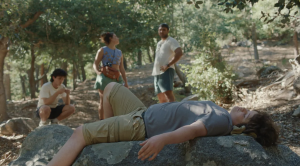
A still from BIG BOYS
HtN: I was so impressed with him and his vulnerability, especially in that last scene in the car. That’s a real sensitive scene for a straight character/straight actor for someone to say, ‘I have a crush on you.’ And it’s the first time he’s ever said that to somebody. But the way he says ‘it’s really cool that you told me that’ – well, I can only wish that that person is out there for everyone so that they could be their first experience with being turned down.
CS: Yeah, me too. I mean, I feel very lucky that there were a few guys like that in my life, and I think that if it hadn’t been for them, I don’t even know if I would’ve been able to make a movie like this because I wouldn’t have had that experience with it to know that it’s even possible. I think that there’s a lot of sensitive, caring, understanding straight men out there. And I do think that a lot of movies, particularly with the gay man/straight man relationship tend to really dramatize it and make it much more violent and threatening and catastrophic. And I like the idea of something that showed a sort of mutual respect and harmony between the two characters and also a straight character learning from a gay character.
HtN: They’re both in uncharted territory in that scene, but its Jamie who is leading them through it.
CS: I thought that was very touching — the idea of Jamie helping to take care of Dan in that moment, and then Dan sort of helping to take care of Jamie in return. And I think that they both, that was probably the other scene that I was the most nervous about, not because of them as actors, but I was just thinking about if we can’t land this scene that I think the movie probably won’t really work or it won’t really feel satisfying ultimately. So it was so much riding on that scene, but the characters can’t act like that’s the big scene, that this is the huge melodramatic cathartic moment. They [the actors] play it very sort of subdued and low key.
HtN: It’s like the movie could have ended when they get dropped off because Jamie still has had a big life experience and is still going to come out stronger and better. But then it’s that thing of picking the scab a little bit. Like, no, no, I’m not ready yet to, I have more to learn and I’m here. I’m ready for it. I’m never going to be as ready for it as I am right now. I’m going back in, say my piece.
CS: Yeah. It’s so that he doesn’t live the rest of his life holding this in as some secret that will probably only curdle with time — this thing that I never had a chance to talk about that was just a shameful thing that we brushed aside. Instead he has a chance to put it out there in the open and be honest about it. And I think just sort of prove to himself that it’s something that’s okay to talk about and acknowledge.
HtN: There’s so few movies that I feel are really over when they’re over. There’s so many times when I’m watching a movie and then I’m talking to somebody, I’m like, oh, ‘I wonder what happens next to him.’ This movie actually does. It feels like it really does finish. It feels like we’ve been a very long journey with Jamie and, at the end, he’s a completely different character and almost everybody else is too. Even his brother — probably the least mature character in the film — actually comes to a better place at the end of it. Jamie’s relationship with his cousin has reached a new place. Everybody is better off for this one weekend camping trip. I mean, it is like an advertisement for national parks.
CS This movie can be anything. It’s a ‘get outdoors’ kind of movie.
HtN: Get outdoors! Well, last question I want to ask you is probably the best decision that you made, which was during fantasy sequences to go ahead and recast Jamie as an older version of Jamie to make us not super uncomfortable. What I’m most curious about is how you decide what Jamie looks like in the future and how did you cast that actor? It feels like the right person.
CS: A lot of that is credit to Jack De Sandz who plays this older version of Jamie who I remember was really excited. He sent me a picture of himself at 14 years old, and he looks just like Isaac, and also queer. He also just had this in into the story. And I think even though it’s a small role in the film, I think his performance says a lot about the kind of person that Jamie strives to be, which is somebody who’s more confident in his own body. And I think that that’s a sort of thing that Jamie learns from Dan because he sees Dan moving through the world with confidence and a sort of swagger, and he’s a bigger guy. And Jamie sees that that’s possible for himself too. You can see the way that he’s embracing that and dressing better for it. And he’s sort of also more collegiate and intellectual. He’s got a knit sweater and he wears glasses now, even though Jamie doesn’t wear glasses in real life.
There’s just part of him that dreams of being an intellectual, I think, and just being an adult at all, because I remember feeling like that as a kid of just sort of wanting to rush ahead to adulthood and A, because I was attracted to older guys, and then B, because I felt like I was swimming in a very emotionally undeveloped, unintelligent world that is high school, where being gay was just hard. And the idea of being among adults that felt safer.
HtN: I think that’s why he liked his cousin, is that she treated him like an adult. So you’ve been through it now, festivals to the release, the whole route. What was your favorite moment of this journey of taking this movie to crowds and seeing people’s reactions and getting to hear from them?
CS: Getting to hear the variety of reactions, hearing people laugh, have a good time, and in a way where it feels like they’re really relating to the character and rooting for him and cringing on his behalf. And then to talk to people afterwards, people truly from teenagers to — I literally spoke to a 95-year-old about relating to the character and feeling like they were seeing themselves on screen and the fact that they felt like the character was really honored and had a lot of dignity — that it was a cathartic experience for them to see. That is the biggest thing that I could have hoped for out of this movie. It’s like that part of giving the movie away to the world is really satisfying, and I hadn’t really felt before.
– Bears Rebecca Fonté (@BearsFonte)

